Lilian Thuram is a staunch advocate for racial justice, and he wants to bring the ideals set forth by MLS BPC overseas.
Lilian Thuram doesn’t get into specifics when recalling racist incidents he endured as a player. He doesn’t have to. He can generalize. He can summarize. They are memories that aren't focused on a particular time or place. Instead, they coalesce into one long-term, collective trauma.
Perhaps the best defender of his generation, Thuram’s game was anchored by a unique and captivating combination of elegance and power that lifted him to soccer’s pinnacle. He won the World Cup, European Championship and Confederations Cup treble with France, earned the Bronze Ball at the 1998 World Cup and lifted trophies with Parma, Juventus and Barcelona. None of that, however, could be relied upon to transcend the color of his skin. And he was reminded of that fact on far too many occasions.
“When I was playing football and there would be a racist incident in the stadium, when I would go back into the changing room, often times what would happen was some of the guys come over, the white guys come over, tap me on the back and say, ‘Sorry about that’ or ‘Don’t worry about it,’” Thuram recalls.
“I’m thinking, ‘This has got to change.’ But even when the journalists would say to me, ‘Oh, what do we need to do Lilian? This has got to change. What to do we do?’ My attitude is, ‘Don’t ask me. I’m the person that’s getting this rude remark or whatever it is. I’m the person who’s taking this. Ask the white players. Ask the white players why they’re not saying something about it. Ask the white players what they’re going to do about it.’”
But after enough episodes and evidence, it became clear to Thuram that the white players, the journalists, the leagues, federations and powers that be weren’t able or willing to accept the responsibility or burden. Racism, he says, was too entrenched, too inextricably bound to the structures of French and European society. The onus would fall, unfairly, on those being harmed or marginalized. And so he acted.
“People who suffered from racism could never wait for anybody to do anything for them,” Thuram tells Sports Illustrated through a translator. “They did it themselves. You have to be really clear you want change. You’ve got to stand up and you’ve got to lead the change.”
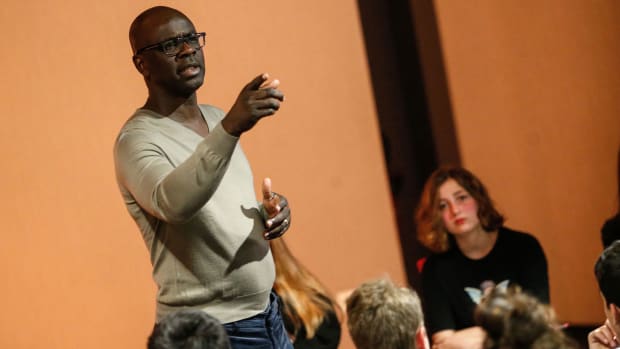
Thuram launched his eponymous foundation, which endeavors to combat and eliminate racism, sexism, homophobia and discrimination through education, while he was still playing. Since he retired as France’s most-capped player in 2008, Thuram, now 49, has built a second career whose impact rivals his first. He’s a lecturer, educator, curator, activist and author of multiple books who’s become a leading voice—it’s eloquent but blunt, like his play—in a country and sport that still struggle with their history, identity and mission. Thuram is up against not only the chronic symptoms and expressions of systemic racism, but against a society that still isn’t ready to listen or change from within, he says.
“It’s almost as though that by speaking out against racism, we’re blaming other people. It’s almost as though we’re splitting society into two camps,” Thuram explains. “It’s really complicated because basically the institutions, be they public or be they sports federations, they try to put the burden of the criminalization on the victims. … Their positioning is that you deny that there’s such a thing as racism, and that way the game goes on. The whole business carries on. What they do is they’ll sort of maybe say, ‘Oh we’re against racism,’ but fundamentally they want the game to go on.”
And so it does, each and every time there’s evidence of abuse on the field, in the stands or on line. According to English organization Kick It Out, which conducts antiracist campaigns and training in conjunction with several soccer governing bodies, reports of racist incidents in professional soccer rose 53.3% from 2018–19 to 2019–20. And abuse related to sexual orientation soared 95%. Thuram doesn’t think that leagues and federations have the stomach for the fight, and he hasn’t seen bodies like Kick It Out or Football Against Racism in Europe, which aren’t run or governed by active players, as the ideal tool to get the job done.
Enter American soccer. Enter Black Players for Change, which formed quickly and organically following the murder of George Floyd one year ago this week. BPC announced its presence with a solemn and powerful demonstration as MLS resumed play last July and has maintained that momentum since. Thuram is seeking a blueprint, a road map, some sort of guide he can follow as he attempts to empower French and European players to unite and to mobilize. He may have found it in America.
Considering the U.S.'s own existential struggle with racism, and considering U.S. soccer’s place in the world, it seems counterintuitive that either would be in position to take a leadership role in the fight Thuram is waging. But BPC cofounder and executive director Justin Morrow, a 12-year MLS veteran who’s now with Toronto FC, says that going global is the idea. Racism may manifest itself in varying ways in various places—Morrow and Thuram acknowledge that their challenges are different—but they’re all expressions of the same insidious, foundational problem.
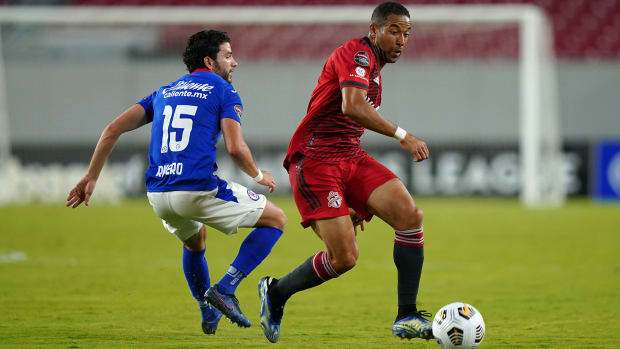
“It was always in our mind from the very beginning, especially because of the group of athletes that we have. It was one of the first conversations we had because there are so many Black players in MLS that aren’t American, and so they were asking when we first came together if this organization was for them,” Morrow says.
From there, it was only natural to share experiences and ideas about reaching out to athletes abroad, and seeing how BPC might serve as an example.
“We’re very mindful of it. We’re a very prideful group and motivated by that fact,” Morrow says of American soccer’s potential influence on this unexpected but vital front. “We can be the leaders in this space, and we have a unique opportunity as a league because we’re still growing. We have ambition to be one of the top leagues in the world but we’re not yet there, and that gives our current players opportunities, leeway, freedom to step up and do things unapologetically that you don’t see players in Europe doing—at least on this scale that we’re doing it or with the collective mindset and idea that we’re doing it. And so we’ve taken advantage of that.”
The connection between Thuram and BPC was forged in large part by Carl Suddler, a professor of history at Emory, and Steve Ortega, a professor of history at Simmons University who became involved with a program at neighboring Harvard that’s now called the Global Sports Initiative. Before GSI’s official launch in 2018, Ortega ran a couple of academic conferences on soccer and globalization that Thuram attended. Ortega then was introduced to BPC and Morrow by Steve Argeris, a sports lawyer who used to work for the Carolina Panthers and Charlotte FC. Last month, Thuram, Morrow, Ortega and several colleagues spoke formally for the first time. Thuram was unaware of BPC before that initial call was set up. But he was quickly impressed and moved. BPC’s very existence, not to mention the progress it’s made, left the French legend “destabilized,” he says.
“I’m destabilized by Black Players for Change because I don’t think something like it would be accepted in France today,” Thuram says.
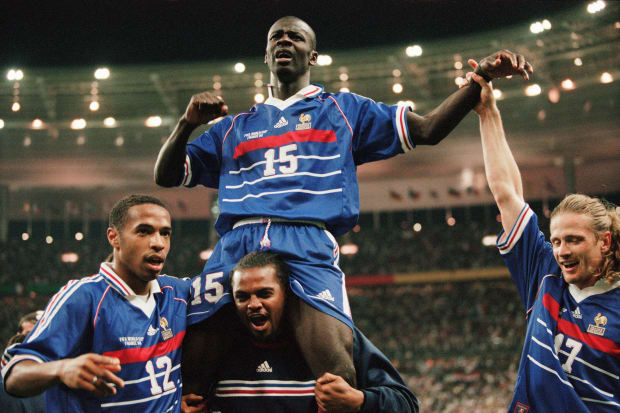
Again, the stories lack certain details because the place and time don’t matter much. It’s about the trend. It’s about the numbing frequency with which Black people in France and Europe are taught or told that they should not gather, rally or work together. The cultural prohibition stems from the days of slavery and, like several vestiges of colonial racism, it’s frustratingly persistent.
Thuram says it would happen while he ate meals with Black teammates. White people inevitably would wander over and ask what was going on. It happens in offices, he says, where “Black people are having a coffee together, the usual sort of thing. They’re at the coffee machine and somebody’s bound to come over and say ‘Hey, what are you guys talking about?’ ”
That conditioning gives Black athletes in France and Europe pause, he says. It’s intimidating. It leaves players believing that they must go it alone, that if they risk “splitting society into two camps,” as Thuram says, they’ll do it without protection or support. The pregame kneeling that became popular in England, for example, didn’t really take hold in France or much of the rest of the continent. Even that was risky. What Thuram sees in BPC is a proactive and courageous commitment to provide backing and generate strength in numbers. BPC, which now has more than 170 members, is evidence that it can be done.
“If any Black player speaks out in France, that person is perceived as a disturbance,” Thuram says. “They’re upsetting the apple cart. That person actually should just stay in their place. Anything that can bring us together, give us an opportunity to speak out, it’s extremely important and that’s regardless of what country it is. But the fact that there is this movement that gives us this opportunity to speak out, that’s extremely powerful.”
On top of that, Morrow explains, players in Europe often are insulated further by agents, attorneys, marketers, friends and family who make it tougher to generate candid and productive conversations. As a result of it all, making connections and building bridges between Black players in the U.S. and Europe is tougher than one might think, despite the common profession and experiences. Armed with the BPC blueprint, Thuram is hoping his reputation might break down some of those barriers. Player-driven unity is the path forward.
“If I spoke out, either with a journalist, with a newspaper, on a TV station, I’m perceived as being racist,” Thuram says. “I’m perceived as being somebody whose message is, ‘I don’t like white people.’ Whereas with an organization that groups so many Black players, the finger won’t be pointed at me any longer. I’m just one voice among others.”
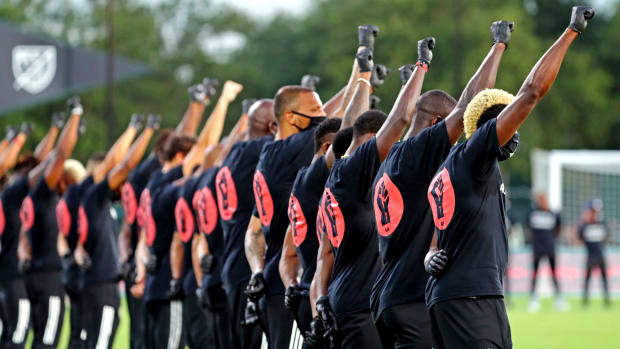
Black Players for Change made that clear as the MLS Is Back Tournament kicked off last July, when more than 100 members stood in silent protest, their fists raised, for eight minutes and 46 seconds—representing the amount of time that former Minneapolis police officer Derek Chauvin knelt on Floyd’s neck. It was a powerful display of unified resolve. That resolve then was tested the following month, as the Kenosha, Wis., police shooting of Jacob Blake aggravated existing tensions. The players held firm. As part of a multisport protest sparked by the NBA’s Milwaukee Bucks, five MLS games were postponed on the evening of Aug. 26 as athletes refused to take the field.
As BPC and its allies found their footing and their voice through those events and more, there was next to no pushback by MLS or its clubs. The league’s website and TV partners highlighted the events at MLS Is Back, and MLS rescheduled the postponed games without sanction or public complaint. A league statement issued Aug. 26 read, in part, “MLS unequivocally condemns racism and has always stood for equality, but we need to do more to take tangible steps to impact change. We will continue to work with our players, our clubs and the broader soccer community to harness our collective power to fight for equality and social justice.”
BPC certainly wants more from MLS, especially when it comes to representation in executive and coaching hires. But compared with the level of institutional support Thuram feels is available in Europe, BPC is living large. The league pledged $1 million in funding to BPC. Last fall, MLS worked with BPC and the players’ union on a package of voting initiatives that focused on registration and election day accessibility. Morrow says that effort represents one of BPC’s most significant accomplishments so far. The league has promised to commit resources to minority career development, grassroots initiatives and supplier diversity, and in February, it announced the hiring of former NFL and A+E Networks executive Sola Winley as its first chief diversity, equity and inclusion officer. MLS and BPC have formal discussions every two weeks.
From the support of most media and most fans (Morrow says the booing and abuse that followed a protest during the national anthem at an FC Dallas game last August was a “dire situation”), to the tangible commitments made by MLS, BPC already has established a foundation that Thuram found difficult to grasp. Its early success also helped inspire the formation of similar groups of USL and NWSL players, the USL Black Players Alliance and the Black Women’s Player Collective, thus demonstrating that determination can be contagious.
“I think [Thuram] was most surprised by the way that it has been accepted,” Morrow says. “He was really taken aback by how we organized as players, decided that we were going to do something, were really bold about the way we did it, organized very efficiently, and everyone accepted it and was very empowering and helpful and nobody tried to tear us down. He was really surprised by that and thought that maybe that might not be the same way across the pond.”
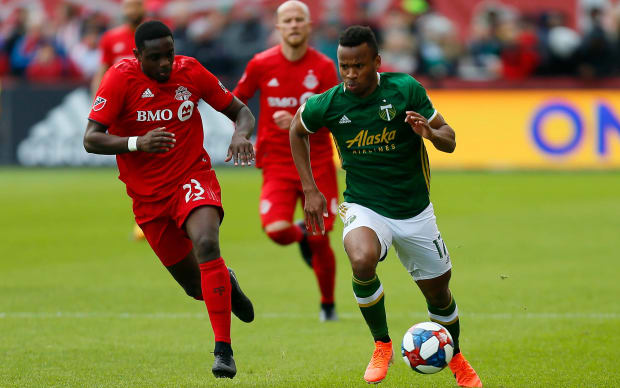
During two extended conversations so far, and through more informal communication with French-speaking BPC members like TFC’s Chris Mavinga and Portland Timbers forward Jeremy Ebobisse, Thuram has been given all the details: how BPC launched and organized, how it’s structured, how it integrates and supports foreign players, how it communicates with MLS and other bodies, ideas for projects and activations and more.
“I think it’s extremely important that this exists in France and in Europe,” Thuram says of an organization like BPC. “I think it’s important that we mutualize and that we combine what works in the U.S. with the situation in Europe so that we work against systemic racism.”
That ultimately is the goal, Morrow says. Racism doesn’t stop at borders or beaches, and so neither will BPC. Through its foreign members, and through American players at clubs in Europe, Morrow and his colleagues are working to chip away at the layers of insulation and the fear that surrounds so many Black players abroad. They're also speaking with organizations like the Professional Footballers' Association in England. Now, in Thuram, they have a potential battering ram as an ally.
“He’s such a massive figure, both in the soccer world but also just as a human being and what he’s doing over there with his foundation, and the way he’s speaking up and taking a leadership role. Players listen to him,” Morrow says. “He’s going to help us bring together the players in France, and we’re hoping that it could be the start. It could be the start of going global. I think a lot these other countries and other players are just looking toward each other and kind of waiting to see the catalyst.
“We think that France could be a good starting point because of the makeup of the country as a footballing nation,” Morrow concludes. “So I’m sure once we get the guys together there, other countries won’t be far behind.”
More Coverage: